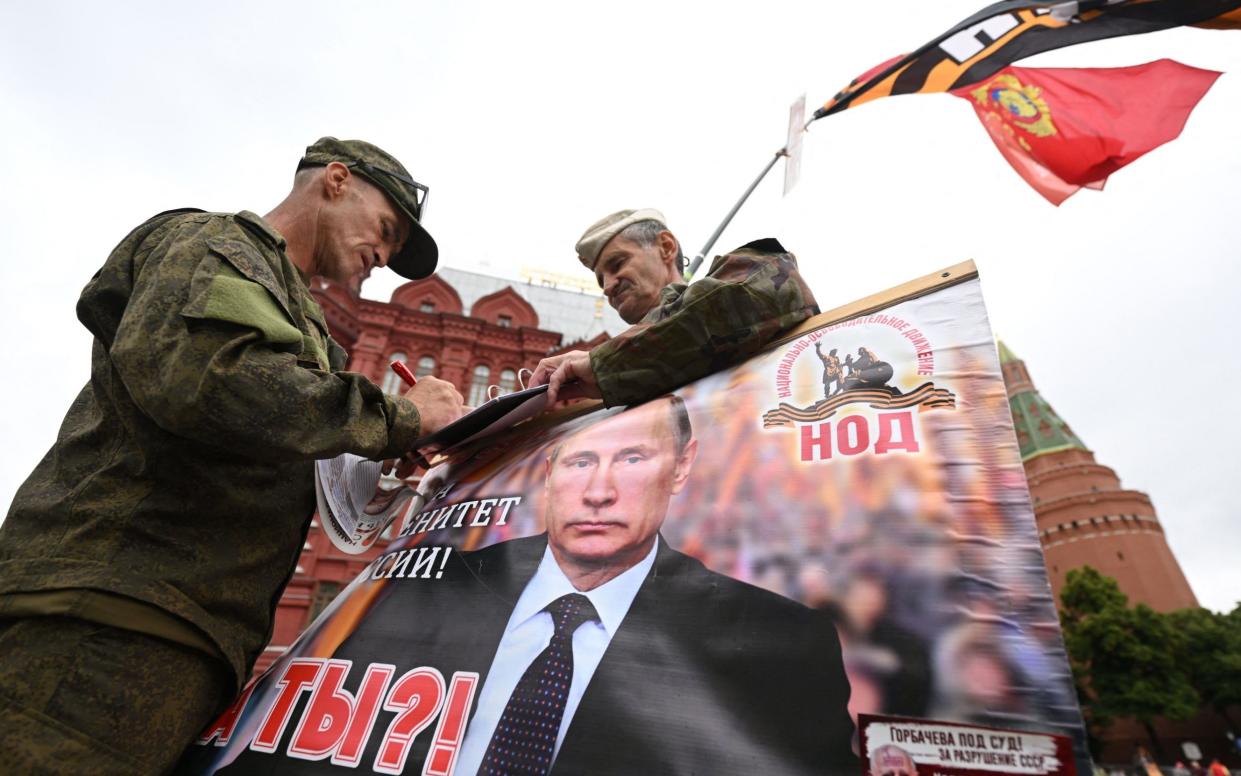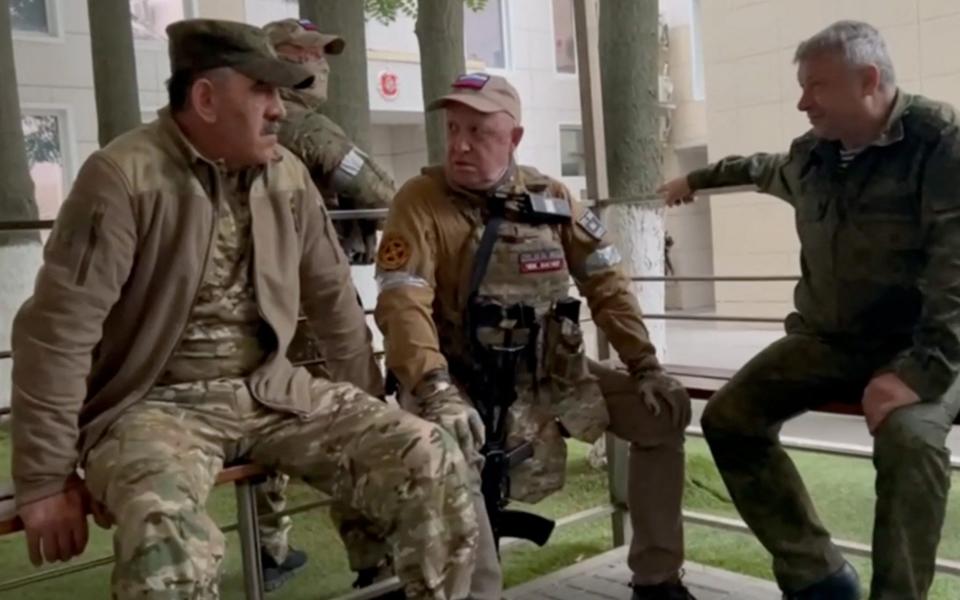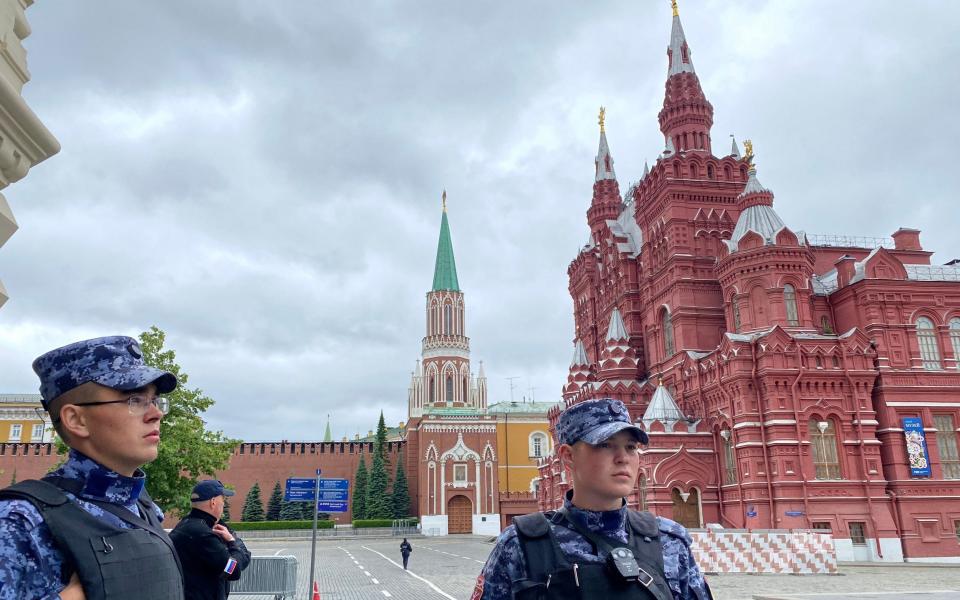Prigozhin’s attempted coup will change Russia forever

- Oops!Something went wrong.Please try again later.
- Oops!Something went wrong.Please try again later.
Regardless of whether or not Yevgeny Prigozhin stands down his coup, the chaos in Russia has seen the country cross a rubicon. The Russian state will emerge both more militarised and fascistic whatever happens. It may be true, as Mr Prigozhin claimed, that “not a drop” of blood was spilled on his march to Moscow, but nothing positive will emerge from the truce. Either Prigozhin’s freikorps will claim more power or Vladimir Putin’s crackdown will be hideous. A more nationalist Russia results either way.
Rather than Russia somehow returning to “normal” the coup has confirmed the country in the image of the puppet Donetsk and Luhansk people’s republics in occupied Ukraine, where warlords, mercenaries and mass mobilisation rule. The attempted overthrow of the state has shown that our lingering assumptions about what we have long called Putin’s Russia need to be re-assessed. Power abhors a vacuum and it was only for so long that the weirdness of Putin’s semi-isolation in the Kremlin would go unchallenged by men on the front line like Prigozhin.
Indeed, the coup marks the definitive turn of a page in Russian history: from an era of oligarchs such as Roman Abramovich, still a lingering presence at the start of the invasion, to the era of warlords with private armies, like Prigozhin. Their numbers have mushroomed since the assault on Kyiv and now include battalions linked to the Russian energy giant Gazprom.

Western officials were already speculating a few weeks ago that Russia’s future would be shaped by private military companies. But their time horizon was a few years not days. The immediate fate of both Prigozhin and Putin and their negotiations will now depend on how these warlords line up, from the Chechen leader Ramzan Kadyrov, whose armed Kadyrovtsy are loyal to him, to Viktor Zolotov the head of the Rosgvardia National Guard.
This matters, because however things play out now, Prigozhin has killed the Putin myth. The idea that in domestic matters everything is controlled or manipulated by the man in the Kremlin. That his intelligence can see any plot or that anyone who defies him will find himself dead in 24 hours. The Russian president now looks confused, shaken and crucially stupid. Prigozhin had been issuing bloodcurdling verbal attacks on the general staff for months. Was it not Putin himself that let him become a celebrity with Wagner appearing even on billboards?
Russia’s future will now be shaped not by a myth of a stab in the back. Putin’s old story of the war has broken. Though the Kremlin may have ordered Russian search engines and social media giants to block search results for Prigozhin and Wagner and called for his arrest on state-controlled propaganda channels, the news of the rebellion has already travelled up and down the front lines by telegram and in the trenches, by word of mouth. So have Prigozhin’s claims: that the war is a failure, Ukraine was never going to attack Russia with the whole Nato bloc behind it and that over 100,000 Russian soldiers have died. The war, according to Prigozhin, was in fact initiated by the oligarchs to profiteer from it. The Kremlin’s narratives, at home or abroad, will never recover from one of its loudest voices – the master of hundreds of its most powerful social media accounts – turning on it so spectacularly.
Western diplomats believe the future will also see Putin weakened internationally. Russia and the Russian president, to the consternation of Western foreign ministries, had over the last year built up an image of themselves as grindingly resisting an all-out proxy war from the West as they called on others to join them in providing tacit or overt support to their rebellion against Washington. But now, Vladimir Putin, instead of looking like a warrior in front of Xi Jinping, looks like a liability who cannot help his country and may in fact, be hastening its geopolitical demise. Kazakhstan, where on the eve of the war in Ukraine, the Kremlin dispatched troops to help the government quell unrest, chose to broadcast it had refused Putin’s requests for support. Others will follow in mocking this not so-strongman.

Why did Prigozhin do it? The psychological reasons are obvious. Why did Napoleon gamble on the 18th of Brumaire? Why did Caesar cross the Rubicon? Because they thought they could win. The interesting question is what were the political conditions, exactly, that made Prigozhin come to this conclusion. The answer lies that for decades Putin has succeeded as a politician but failed to build a modern state. Ruling by, with and tolerating baroque corruption. Abhorring structures and institutions, which this kleptocracy undermined, Putin always chose to reward ad hoc loyalists and workarounds, like the Wagner Group.
That this contradiction could not last forever was the thesis of my first book Fragile Empire. The result was the Russian army went into war based on comically absurdist plans drawn up to please one man reliant on covert ops and military units hollow from corruption. Prigozhin, who, unlike Putin, ran a real dictatorial tight-ship, sensed his chance. “That’s why we are the patriots,” he said, snarling in fatigues, after entering Rostov, “and the ones who oppose us today are those who have rallied around scum. Because we do not want the country to continue living in corruption, deception and bureaucracy.” This still remains the case.
The old system is over
The mutiny has dramatically weakened Putin and his war effort. As it stands, the old Putin system, where the man insiders called the Tsar fought and stole under his leadership, as he occasionally poisoned a journalist or an opposition leader is over. Over the next 48 hours Putin may come to some sort of uneasy truce with his one-time caterer, but the result in the long-term will be a fundamental rebalancing of power away from him. He may still sit in the Kremlin in a year’s time, but the era when he was the only thing that mattered in Russia is over. Prigozhin buried it, whatever happens next.
This is an auspicious but also ominous moment for Ukraine and the West. Kyiv’s counter-offensives, which whilst ongoing, had not enjoyed the early success they might have hoped for, now have an incredible chance to capitalise on the bankruptcy of Russian morale, disorientation and distraction. The political chaos in Moscow aids Ukraine in the short-run, but in the long-run, if an even more fascistic and hyper-militarised Russia emerges it will require ever greater resources, both in terms of men and material, to keep fighting. Meanwhile, for the West, the terrifying question of the control of Russia’s nuclear weapons must be the north star of its strategy, however unpleasant that means the interlocutors are. Who, at this present time, controls the many tactical nuclear weapons in the field? Russia’s agonies, as a state and as a society, will last much longer than those of Ukraine. But the allies should abandon any hope of Russia reverting to “normality” any time soon.
It is not a sad and scary future which awaits the Russian people – that is already their present.
Ben Judah is the author of This Is Europe: The Way We Live Now published by Picador

